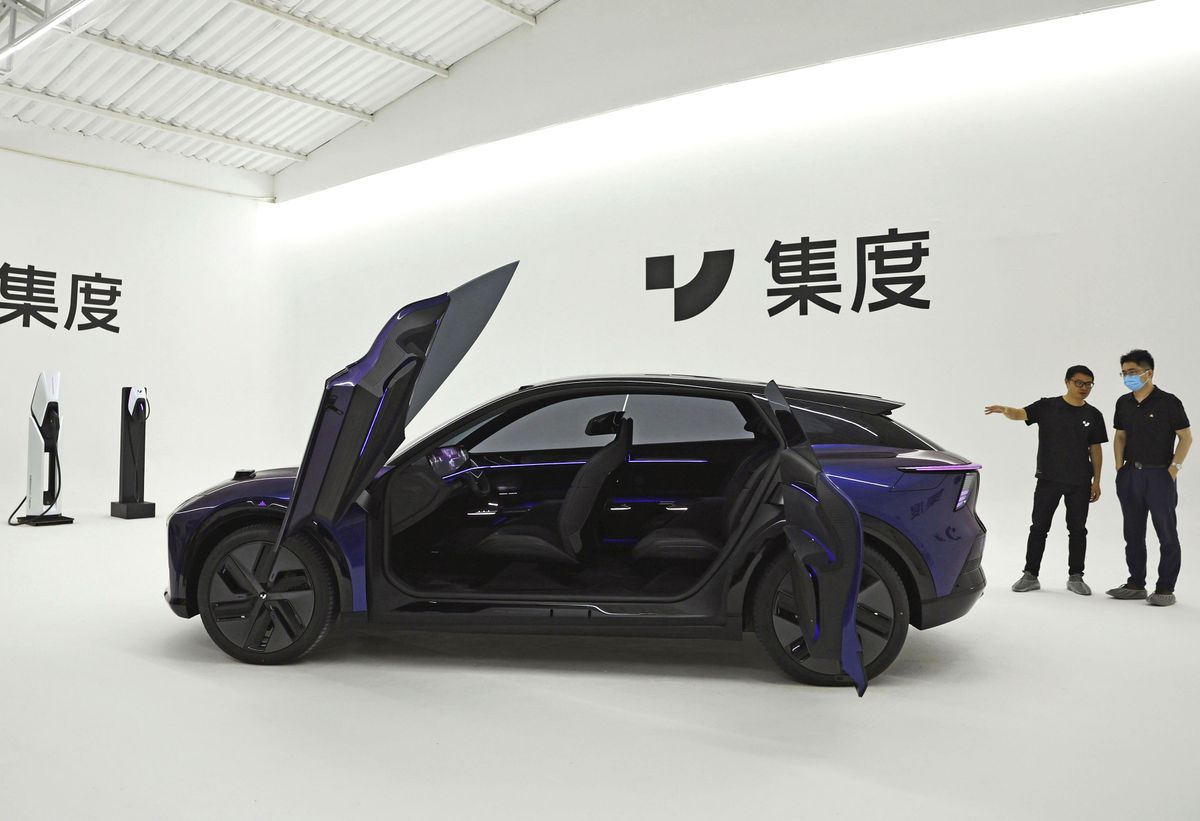Chinese Joint Venture Will Begin Mass-Producing an Autonomous Electric Car
With the Robo-01, Baidu and Chinese carmaker Geely aim for a fully self-driving car

The Robo-01 autonomous electric car shows off its butterfly doors at a reveal to the media in Beijing, in June 2022.
In October, a startup called Jidu Automotive, backed by Chinese AI giant Baidu and Chinese carmaker Geely, officially released an autonomous electric car, the Robo-01 Lunar Edition. In 2023, the car will go on sale.
At roughly US $55,000, the Robo-01 Lunar Edition is a limited edition, cobranded with China’s Lunar Exploration Project. It has two lidars, a 5-millimeter-wave radars, 12 ultrasonic sensors, and 12 high-definition cameras. It is the first vehicle to offer on-board, AI-assisted voice recognition, with voice response speeds within 700 milliseconds, thanks to the Qualcomm Snapdragon 8295 chip.
This article is part of our special reportTop Tech 2023.
“It’s a car, and, even more so, a robot,” said Jidu CEO Joe Xia, during the live-streamed unveiling of the car (as translated from the Mandarin by CNBC). He added that it “can become the standard for self-driving cars.”
But just how autonomous the car is remains to be seen: In January 2022 Baidu and Jidu said the car would have Level 4 autonomous driving capability, which does not require a human driver to control the vehicle. But the press release at the car’s launch made no mention of Level 4, saying only that the car offered “high-level autonomous driving.”
The blurred language may have been dictated by lawyers. China has yet to establish laws or regulations governing autonomous vehicles for the consumer market. For the time being, a driver must remain in control of the car. In September 2022, Baidu cofounder and CEO Robin Li noted that lower levels of autonomy shield car companies from liability in the event of a crash, because the driver is expected to be in control. With Level 4, the manufacturer of the car or the operator of the “robotaxi” service using the car would be to blame.
Nonetheless, the Robo-01 launch signals a dramatic shift in the automotive industry, which has been slow to adopt electric cars and even slower to embrace autonomy. No other consumer car on the market yet offers Level 4 autonomy. Tesla’s Full Self Driving ability, despite its fancy name and the pronouncements of its CEO, is only Level 2, or “partial automated driving” under the definition of SAE International (formerly the Society of Automotive Engineers). Other autonomous-vehicle makers, including Tesla, are collecting data from mass-produced L2 vehicles to train L4 algorithms.
“It’s a car, and, even more so, a robot,” said Jidu CEO Joe Xia.
Meanwhile, Mercedes-Benz is offering its Drive Pilot Level 3 autonomous driving system on S-Class and EQS sedans in Germany. Level 3 handles all aspects of driving, but it requires that the driver remain ready to regain control if requested. Drivers need not keep their eyes on the road, but Drive Pilot will disengage if the driver’s face is obscured.
That raises the question of what Robo-01 can do that the Mercedes Drive Pilot cannot. And what features will Robo-01 use to keep drivers’ hands on the wheel, as required under current Chinese law? Answers to those questions may have to wait until Robo-01 ships.
Regardless of the car’s official autonomy designation, Baidu has billed its self-driving package, Apollo, as having Level 4 capabilities. That includes what the company calls a Point-to-Point Autopilot, designed to handle highway, city street, and parking scenarios. Jidu is conducting further tests in Beijing and Shanghai to ensure that its Point-to-Point Autopilot will cover all major cities in China.
The absence of a steering wheel is a statement in itself.
Chinese regulations do allow Level 4 in robotaxis that operate within designated geofenced areas, and Apollo has already shown what it can do in Baidu’s Apollo Go robotaxis, which have delivered more than 1 million rides in at least 10 cities across China. Baidu recently unveiled its latest autonomous robotaxi, the Level-4 Apollo RT6, which has a detachable steering wheel. The absence of a steering wheel is a statement in itself, and it frees up cabin space for extra seating or even desktops, gaming consoles, and vending machines.
China could well become the world’s largest market for autonomous vehicles, with fully autonomous vehicles accounting for more than 40 percent of the country’s new vehicle sales in 2040, and 12 percent of the vehicle installed base, according to global consulting firm McKinsey.
In 2018, China’s Ministry of Industry and Information Technology, together with the Ministry of Public Security and the Ministry of Transportation, published standards for setting up road-test facilities for intelligent automobiles. Soon after, provinces and cities across China began setting up their own road-testing facilities.
Of the many Chinese companies already preparing to enter the autonomous vehicle market, Baidu is the biggest player. Its Apollo open-source software development platform launched in 2017. Two years later, the company was granted the first Level 4 road-test licenses in the country. More recently it received fully driverless permits in Wuhan and Chongqing, making Baidu the only company of its kind in China to provide ride-hailing services without any human drivers present in the car, as Waymo does in Phoenix and Cruise does in San Francisco. Meanwhile, its Abolong L4 Autonomous Bus is operating commercially in enclosed campuses in at least 24 Chinese cities.
The Robo-01 is powered by a 100-kilowatt-hour lithium battery from Chinese battery manufacturer Contemporary Amperex Technology Co., or CATL. It can accelerate from 0 to 60 miles per hour (97 kilometers per hour) in about 4 seconds and can go 600 km on a charge.
So, the car can drive far, and it can drive fast. But can it drive itself? We’ll find out in 2023.
This article appears in the January 2023 print issue as “Baidu and Geely Will Mass-Produce an Autonomous EV.”
This article was updated on 6 December 2022.

Top Tech 2023
Top Tech 2023: A Special Report
Preview exciting technical developments for the coming year.
Can This Company Dominate Green Hydrogen?
Fortescue will need more electricity-generating capacity than France.
Pathfinder 1 could herald a new era for zeppelins
A New Way to Speed Up Computing
Blue microLEDs bring optical fiber to the processor.
The Personal-Use eVTOL Is (Almost) Here
Opener’s BlackFly is a pulp-fiction fever dream with wings.
Baidu Will Make an Autonomous EV
Its partnership with Geely aims at full self-driving mode.
China Builds New Breeder Reactors
The power plants could also make weapons-grade plutonium.
Economics Drives a Ray-Gun Resurgence
Lasers should be cheap enough to use against drones.
A Cryptocurrency for the Masses or a Universal ID?
What Worldcoin’s killer app will be is not yet clear.
The company’s Condor chip will boast more than 1,000 qubits.
Vagus-nerve stimulation promises to help treat autoimmune disorders.
New satellites can connect directly to your phone.
The E.U.’s first exascale supercomputer will be built in Germany.
A dozen more tech milestones to watch for in 2023.
- Toyota Becomes Largest Car Company to Test Driverless Cars on Public Roads ›
- People Want Driverless Cars with Utilitarian Ethics, Unless They're a Passenger ›
- Deep Learning Makes Driverless Cars Better at Spotting Pedestrians ›
- Making Driverless Cars More Expressive ›


